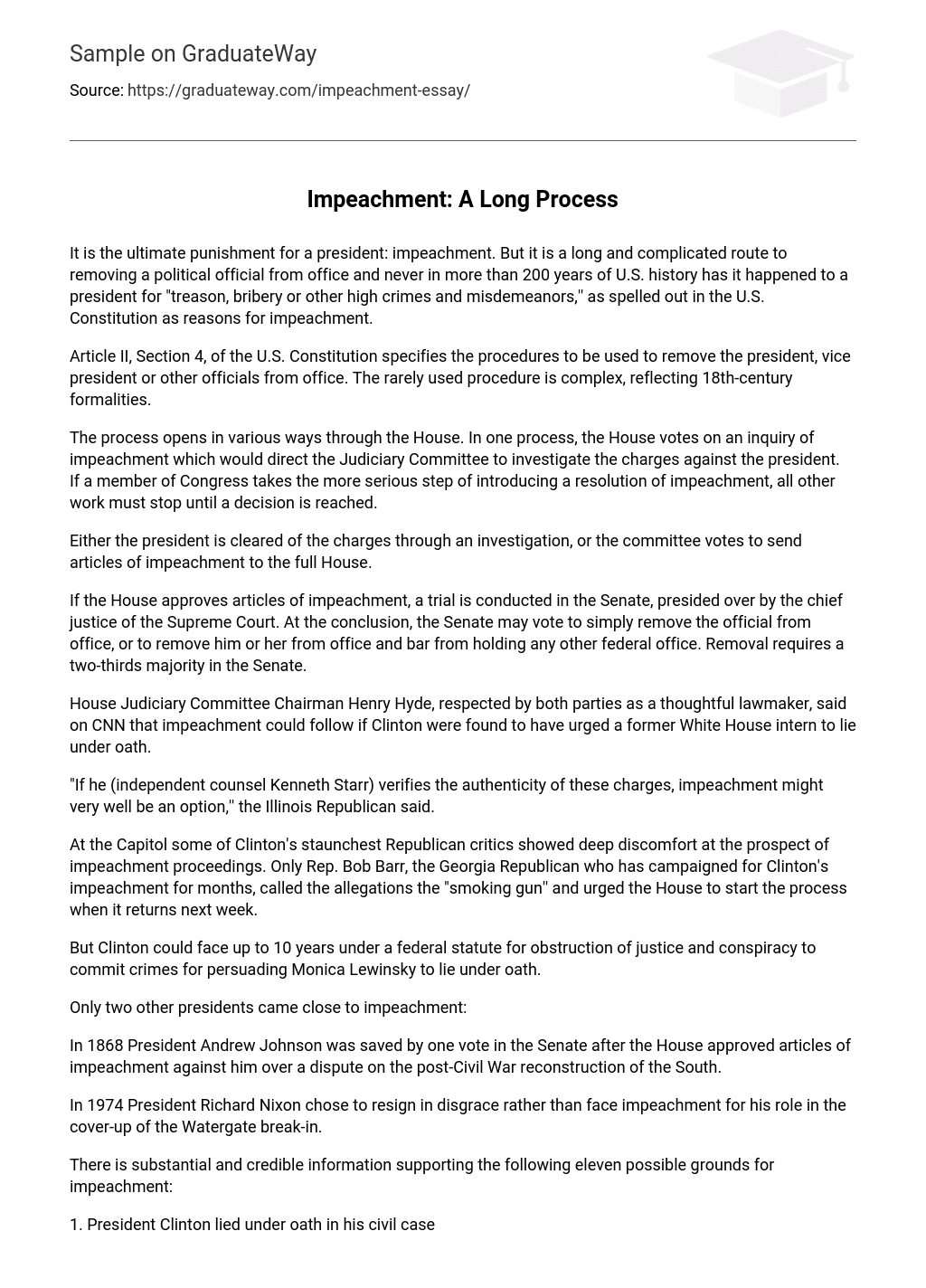The process of impeachment, which serves as the ultimate punishment for a president, is both lengthy and intricate. Throughout more than 200 years of U.S. history, no president has ever faced impeachment on grounds of “treason, bribery or other high crimes and misdemeanors” as specified in the U.S. Constitution.
The U.S. Constitution’s Article II, Section 4 outlines the removal of the president, vice president, or other officials from office. This process is rarely utilized and follows formalities that date back to the 18th century.
There are various ways to impeach a president in the House. One method involves voting on an impeachment inquiry, which directs the Judiciary Committee to investigate allegations against the president. If a member of Congress introduces an impeachment resolution, all other legislative activities halt until a decision is made.
There are two possible results in a presidential investigation: either the charges are cleared or the committee decides to send articles of impeachment to the entire House.
If the House votes for impeachment, the Senate will conduct a trial with the chief justice of the Supreme Court present. After the trial, the Senate has the power to remove the official from office and potentially prevent them from holding any other federal position. A two-thirds majority in the Senate is required for removal.
Chairman Henry Hyde of the House Judiciary Committee, respected by members from both parties for his cautious approach, stated on CNN that if it was revealed that Clinton had urged a former White House intern to commit perjury, impeachment could be a potential consequence.
The Illinois Republican stated that if independent counsel Kenneth Starr confirms the validity of these accusations, impeachment could potentially be considered.
Although some Republicans at the Capitol have reservations about impeaching Clinton, Rep. Bob Barr of Georgia, who has consistently supported Clinton’s impeachment, referred to the allegations as undeniable evidence and urged the House to begin the process upon their return next week.
According to a federal law addressing obstruction of justice and conspiracy to commit crimes, Clinton could potentially receive a prison sentence of up to 10 years. This is due to his role in convincing Monica Lewinsky to commit perjury.
Only two other presidents have approached impeachment:
In 1868, President Andrew Johnson narrowly escaped impeachment in the Senate by a single vote after the House had previously impeached him due to a disagreement about reconstructing the South following the Civil War.
Instead of facing impeachment charges, President Richard Nixon decided to resign in 1974 because of his participation in the cover-up of the Watergate break-in.
Eleven potential grounds for impeachment are supported by substantial and credible information.
President Clinton was convicted of perjury in his civil case for deceitfully denying any sexual involvement, relationship, or relations with Monica Lewinsky.
President Clinton deceitfully provided the grand jury with inaccurate information concerning his sexual relationship with Ms. Lewinsky.
President Clinton made false statements under oath during his civil deposition, concerning his sexual relationship with Ms. Lewinsky, their interactions, and the exchange of numerous gifts.
President Clinton committed perjury during his civil deposition by providing misleading information about his conversations with Ms. Lewinsky regarding her involvement in the Jones case.
The President engaged in obstructing justice in the Jones case and had a secret arrangement with Ms. Lewinsky to conceal the gifts that were subpoenaed by Ms. Jones’s attorneys, all with the purpose of hiding the truth about their relationship.
In the Jones case, the President and Ms. Lewinsky worked together to hide the truth about their relationship. Their plan included multiple steps: (i) both agreed to lie under oath regarding their sexual relationship; (ii) the President suggested that Ms. Lewinsky create a false affidavit as evidence to support her fabricated testimony, thus protecting their relationship from scrutiny; (iii) Ms. Lewinsky submitted the manufactured affidavit; (iv) during his deposition, the President used the fraudulent affidavit to avoid discussing Ms. Lewinsky; and (v) ultimately, the President committed perjury by lying under oath about his involvement with Ms. Lewinsky during his civil deposition.
There are allegations that President Clinton may have obstructed justice by helping Monica Lewinsky secure a job in New York. This happened at a time when she could have been a detrimental witness against him if she revealed the truth in the Jones case.
8. President Clinton perjured himself during his civil deposition by providing false information about his conversations with Vernon Jordan regarding Ms. Lewinsky’s participation in the Jones case.
9. The President tried to corruptly influence the testimony of his personal secretary, Betty Currie, after his civil deposition, which was an improper act of tampering with a potential witness.
President Clinton impeded the grand jury investigation by refusing to testify and being dishonest with senior White House aides. Consequently, these aides relayed his false statements to the grand jury, resulting in deception, hindrance, and obstruction of the proceedings.
President Clinton committed misconduct by engaging in various actions to impede and obstruct potential inquiries by the United States Congress. These actions include providing false information to the public and Congress in January 1998 about his relationship with Ms. Lewinsky, making a commitment to cooperate with the grand jury investigation but subsequently declining six invitations to testify voluntarily before the grand jury, asserting Executive Privilege, misleading the grand jury in August 1998, and deceiving the public and Congress again on August 17, 1998.
The President’s perjury in regards to his relationship with Ms. Lewinsky is the initial basis for impeachment. The inclusion of explicit details relating to these grounds is crucial for the President’s testimony, as further explained within those grounds.





